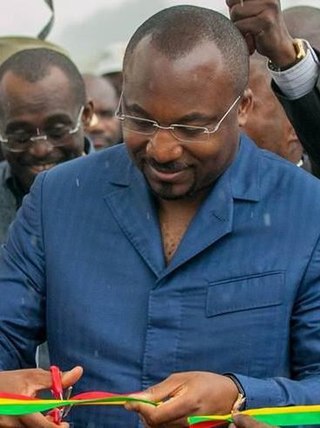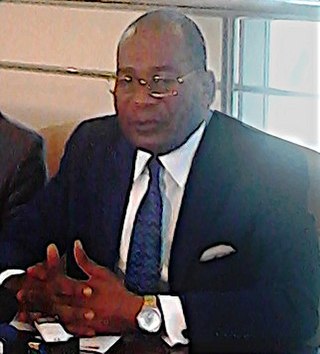Related Research Articles

Isidore Mvouba is a Congolese politician who was Prime Minister of Congo-Brazzaville from 2005 to 2009. He is a member of the Congolese Labour Party and held key positions under President Denis Sassou Nguesso beginning in 1997.
Gabriel Oba-Apounou is a Congolese politician. During the single-party rule of the Congolese Labour Party (PCT), he was First Secretary of the Congolese Socialist Youth Union; he also served in the government of Congo-Brazzaville as Minister of Youth from 1979 to 1985, Minister of Agriculture from 1985 to 1989, and as Minister of State for Youth and Rural Development from 1989 to 1991. Later, he was First Vice-President of the National Assembly from 2002 to 2007, and he has been a member of the Senate since 2008.
Justin Koumba is a Congolese politician who was President of the National Assembly of Congo-Brazzaville from 2007 to 2017. He was an official at the United Nations and served in the government of Congo-Brazzaville as Minister of National Education in 1992; subsequently, he was President of the National Transitional Council from 1998 to 2002 and President of the National Human Rights Commission from 2003 to 2007.
François Ibovi is a Congolese politician who held a succession of key posts in the government of Congo-Brazzaville beginning in 1997. Closely associated with President Denis Sassou Nguesso, he was Minister of Communication from 1997 to 2002, Minister of Territorial Administration from 2002 to 2007, First Vice-President of the National Assembly from 2007 to 2012, and Minister of Health from 2012 to 2016.
Pierre-Damien Boussoukou-Boumba is a Congolese politician. During the single-party rule of the Congolese Labour Party (PCT), he served in the government of Congo-Brazzaville as Minister of Health from 1979 to 1984, as Minister of Scientific Research from 1984 to 1989, and as Minister of Basic Education from 1989 to 1991. He was Ambassador to the United States in the 1990s and Minister of Small and Medium-Sized Enterprises from 1997 to 2002; subsequently he was a Deputy in the National Assembly of Congo-Brazzaville from 2002 to 2007. Boussoukou-Boumba was also President of the Union for the Defence of Democracy (UDD), a political party, from 1996 to 2011.
Pierre-Michel Nguimbi is a Congolese politician who served in the government of Congo-Brazzaville as Minister of Technical and Vocational Education from 2002 to 2009. Previously, he briefly served as Minister of Scientific and Technological Development in 1992, and he was Ambassador to Israel and Ambassador to France during the mid-1990s. After leaving the government, he was Ambassador to Senegal from 2012 to 2017.

Gilbert Ondongo is a Congolese politician who has served in the government of Congo-Brazzaville as Minister of State for the Economy, Industry and Public Finances since 2017. Previously he was Minister of Labour from 2005 to 2009, and Minister of Finance from 2009 to 2016.
Mpaki Bernard is a Congolese politician who served in the government of Congo-Brazzaville as Minister of Fishing and Aquaculture from 2012 to 2016. A member of the Congolese Movement for Democracy and Integral Development (MCDDI), he was first vice-president of the National Assembly of Congo-Brazzaville for a brief period in 1992, and he was second vice-president of the National Assembly from 2007 to 2012.

Pierre Ngolo is a Congolese politician who has been Secretary-General of the Congolese Labour Party (PCT) since August 2011. He was First Secretary of the National Assembly of Congo-Brazzaville from 2002 to 2012. He has served as the President of the Senate of Congo-Brazzaville since 2017.
Léon-Alfred Opimbat is a Congolese politician. He served in the government of Congo-Brazzaville as Minister of Health from 1992 to 1993 and as Minister of National Solidarity and Humanitarian Action from 1997 to 2002, with additional responsibility for the health portfolio beginning in 1999. Subsequently he was a Deputy in the National Assembly from 2002 to 2007 and again from 2007 to 2011. He was also President of the New Democratic Forces (FDN), a political party, from 2007 to 2011; when the FDN merged itself into the ruling Congolese Labour Party (PCT) in July 2011, Opimbat became a member of the PCT Political Bureau. He was Minister of Sports from 2011 to 2017, and he has been First Vice-President of the National Assembly since 2017.

Serge Michel Odzoki is a Congolese politician. A member of the Congolese Labour Party (PCT), he is a journalist by profession and worked for years as a diplomat before serving in the government of Congo-Brazzaville as Minister of Sports and Youth from December 2007 to September 2009. He has been a Deputy in the National Assembly since 2009 and Spokesman of the PCT since 2011.

Pascal Tsaty Mabiala is a Congolese politician who has been the Secretary-General of the Pan-African Union for Social Democracy (UPADS) since 2006, as well as President of the UPADS Parliamentary Group since 2007. He stood as the UPADS candidate in the 2016 presidential election.
Alexandre Denguet Atticky was a Congolese politician. Under the single-party rule of the Congolese Labour Party (PCT), he served in the government of Congo-Brazzaville as Minister of Labour from 1971 to 1975 and was Ambassador to France in the late 1970s. From 2002 to 2012, Denguet Atiki was a Deputy in the National Assembly, and he was also President of the Parliamentary Group of the Presidential Majority from 2007 to 2012.
René Serge Blanchard Oba is a Congolese politician. He is the President of the Movement for Solidarity and Development (MSD), a political party, and he was the Administrator-General of the Congo Telecommunications Company (SOTELCO) from 2003 to 2008. He was a Deputy in the National Assembly of Congo-Brazzaville from 2007 to 2012.

Denis-Christel Sassou Nguesso is a Congolese politician. He is the son of President of Congo-Brazzaville Denis Sassou Nguesso. Denis Christel was administrator-general of Cotrade and was subsequently appointed deputy director-general of the National Petroleum Company of the Congo in December 2010. He was elected to the National Assembly of Congo-Brazzaville in 2012.

Pierre Mabiala is a Congolese politician who has served in the government of the Congo-Brazzaville as Minister of Land Affairs since 2017. He serves in Anatole Collinet Makosso's government. Previously he was a Deputy in the National Assembly of Congo-Brazzaville from 2002 to 2007, a Senator from 2008 to 2009, Minister of Land Affairs from 2009 to 2016, and Minister of Justice from 2016 to 2017.

Parliamentary elections were held in the Republic of the Congo on 15 July 2012. A second round was held on 5 August 2012. The second round was previously moved forward to 29 July, without explanation, but ultimately was held on the original date.
Jean-Didace Médard Moussodia is a Congolese politician who has served as a Deputy in the National Assembly of Congo-Brazzaville since 2002.
Raymond Isaac Follo is a Congolese politician who has served in the National Assembly of Congo-Brazzaville since 2012.
Jean-Claude Ibovi is a Congolese politician who has served as a Deputy in the National Assembly of Congo-Brazzaville since 2007. He is President of the Movement for Democracy and Progress (MDP), a small pro-government party.
References
- 1 2 3 4 "Qui est il ?" Archived 2011-06-17 at the Wayback Machine , Sylvestre Ossiala website (accessed 6 June 2010) (in French).
- 1 2 3 "Sylvestre Ossiala et Albert Symphorien Mboussa (FDU) commentent leur victoire", Les Dépêches de Brazzaville, 1 July 2002 (in French).
- ↑ "Assemblée nationale : les élus du second tour et leur appartenance politique", Les Dépêches de Brazzaville, 28 June 2002 (in French).
- ↑ "La coordination de l’Agence de développement de Talangaï (Brazzaville) entreprend de former des jeunes aux petits métiers", Les Dépêches de Brazzaville, 4 October 2002 (in French).
- ↑ "Le député Sylvestre Ossiala lance les travaux de construction du pont sur la Tsiémé à Talangaï (Brazzaville)", Les Dépêches de Brazzaville, 26 October 2002 (in French).
- ↑ "Le député Sylvestre Ossiala visite sa circonscription électorale de Talangaï (Brazzaville)", Les Dépêches de Brazzaville, 21 June 2003 (in French).
- ↑ "Sylvestre Ossiala fait un don à l'école de la liberté (Talangaï)", Les Dépêches de Brazzaville, 8 January 2004 (in French).
- ↑ Pascal-Azad Doko, "Adhésion des députés Sylvestre Ossiala et Rigobert Maboundou", La Semaine Africaine, number 2,684, 6 April 2007, page 6 (in French).
- ↑ Ya Sanza, "Législatives : La liste des duels du second tour", Congopage website, 3 July 2007 (in French).
- ↑ "Les résultats des élections législatives, avant l'examen des contentieux électoraux", La Semaine Africaine, number 2,720, 21 August 2007, page 7 (in French).
- ↑ Roger Ngombé, "Assemblée nationale. Une commission ad hoc est mise en place pour examiner le règlement intérieur et le règlement financier", Les Dépêches de Brazzaville, 5 September 2007 (in French).
- ↑ Cyr Armel Yabbat-Ngo, "Session inaugurale de la 12ème législature de l'Assemblée nationale: Un fidèle du président Sassou au perchoir", La Semaine Africaine, number 2,725, 7 September 2007, page 3 (in French).
- ↑ Cyr Armel Yabbat-Ngo, "Rentrée parlementaire de la 12ème législature: Les bureaux des commissions permanentes ont été enfin élus", La Semaine Africaine, number 2,729, 21 September 2007, page 5 (in French).
- ↑ Roger Ngombé, "Le député Sylvestre Ossiala finance les projets productifs de cinq cents jeunes de sa circonscription", Les Dépêches de Brazzaville, 17 July 2009 (in French).
- ↑ Roger Ngombé, "Dynamique Ossiala pour le Chemin d'avenir est créée", Les Dépêches de Brazzaville, 7 May 2010 (in French).
- ↑ "Membres de comité central du PCT élus par le VIe congrés", Les Dépêches de Brazzaville, number 1,294, 29 July 2011 (in French).
- ↑ "Élections législatives du 15 juillet 2012 - Liste des élus au premier tour", Les Dépêches de Brazzaville, 22 July 2012 (in French).
- 1 2 "Résultats du premier tour des élections législatives 2012", La Semaine Africaine, 24 July 2012 (in French).
- ↑ "Echo des législatives", La Semaine Africaine, 24 July 2012 (in French).
- ↑ Roger Ngombé, "Assemblée nationale : Justin Koumba reconduit à la présidence", Les Dépêches de Brazzaville, 5 September 2012 (in French).
- ↑ "Justin Koumba réélu à la présidence de l’Assemblée nationale du Congo", Panapress, 6 September 2012 (in French).
- ↑ Christian Brice Elion, "Sylvestre Ossiala présente son livre sur l’action économique de Denis Sassou N’Guesso" Archived 2014-05-17 at the Wayback Machine , Congo-Site, 25 November 2013 (in French).
- ↑ "Elections législatives : Le P.c.t a sorti la liste de ses candidats et les surprises ne manquent pas", La Semaine Africaine, 10 June 2017 (in French).